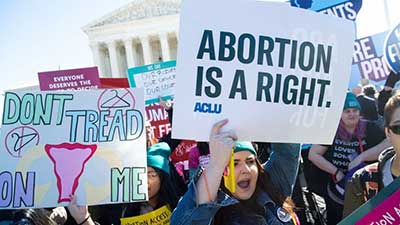Relevance: GS-2: Effect of policies and politics of developed and developing countries on India.
Key Phrases: Roe v. Wade, Planned Parent-hood v. Casey, reproductive and bodily autonomy, Dobbs vs Jackson Women’s Health Organization, Reproductive Choice, Bodily Integrity, Unsafe Abortions, Domino Effect on Other Rights
Why in News?
- The U.S. Supreme Court in its recent judgement in Dobbs vs. Jackson Women’s Health Organization case has ended the constitutional right to abortion, overturning the landmark 1973 Roe vs. Wade decision that had enshrined a woman’s right to her body.
- Planned Parent-hood vs. Casey, a 1992 case that upheld Roe was also overturned.
Key Highlights:
- The judgement has withdrawn from women their constitutional right to reproductive and bodily autonomy.
- The logic given is that abortion is not mentioned in the U.S. Constitution and is not covered by the landmark 14th Amendment of 1868 that safeguards liberty. Thus, the authority to regulate abortion is returned to the people and their elected representatives.
- The U.S. has joined three other countries — El Salvador, Nicaragua and Poland that have rolled back abortion rights since 1994, according to the Center for Reproductive Rights.
- This Supreme Court decision in Dobbs vs. Jackson Women’s Health Organization, has in effect divided the U.S. territorially — States where women have the right to abortion, and those where they do not.
- Thirteen States in the United States have ‘trigger bans’ in place which means abortions will be banned with immediate effect with the overturning of judgement.
- Women who seek an abortion will have to travel to States where it is legal, making it an expensive proposition, thus, not available to all.
What is Roe vs. Wade judgement, 1973?
- The judgement struck down State level abortion limits on a foetus before it is viable to survive outside the womb, which is considered to be the 24-28 week mark.
- Supreme Court of the United States (SCOTUS) ruled abortion as the constitutional right in the U.S.
- Following the Roe vs. Wade judgement, there was a right to abortion in the first three months (trimester) of pregnancy; some limitations were placed in the second trimester; and in the third trimester, States could restrict or ban abortions as the foetus neared the point where it could live outside the womb except for cases in which the life and health of the mother were endangered.
- Foetal is viable at the point at which a foetus can survive outside the womb. It is generally considered to be around 23 or 24 weeks.
Do you know?
- United Nations Population Fund (UNFPA), formerly United Nations Fund for Population Activities (UNFPA), is the United Nations sexual and reproductive health agency
- Its mission is to deliver a world where every pregnancy is wanted, every childbirth is safe and every young person's potential is fulfilled.
- The Thirteenth Amendment to the U.S. Constitution freed the slaves and the Fourteenth Amendment made them citizens.
- The Fourteenth Amendment extended citizenship not only to all former slaves but to all persons born or naturalised in the United States.
- Amendment XIV to the U.S. Constitution: Civil Rights (1868).
- All persons born or naturalised in the United States, and subject to the jurisdiction thereof, are citizens of the United States and of the State wherein they reside.
- No State shall make or enforce any law which shall abridge the privileges or immunities of citizens of the United States;
- nor shall any State deprive any person of life, liberty, or property, without due process of law;
- nor deny to any person within its jurisdiction the equal protection of the laws.
- The Supreme Court ultimately used that to endorse other rights and prevent States from implementing laws that restrict those not directly stated in the Constitution, including the right to privacy.
What will be the impact of the Judgement?
- Increased sufferings of Marginalised Groups:
- Research has shown that abortion bans severely impact people of marginalised groups who already struggle to access health care, including abortion and thus, a compounding effect on the miseries of poor people.
- Hiking up of Unsafe Abortions:
- As per the UN sexual and reproductive health agency (UNFPA) and the World Health Organization (WHO), a staggering 45% of all abortions around the world are unsafe, making the procedure a leading cause of maternal death.
- It is expected that more unsafe abortions will occur around the world if access becomes more restricted.
- This may put the U.S. on a similar path to Ireland between 1983 and 2018 where women were forced to miscarry the unviable foetus rather than terminate the pregnancy with medical assistance, which took a heavy toll on their lives.
- Women with unplanned or unwanted pregnancies, including possibly in some jurisdictions those that endanger the mother’s life or are a result of rape or incest, may have no option but to seek medical assistance in other States.
- This needs resources and support structures, and many women will be left with no option other than unsafe abortions at home.
- Domino Effect on other Rights:
- The judgement can have a domino effect on other rights like contraception and same sex marriage.
- The process for other rights to be taken away has been opened with this judgement.
Conclusion
- The verdict represents a “major setback” for sexual and reproductive health to the women of the nation.
- Abortion is still linked to State-sanctioned conditions rather than a woman's rights and thus, translating the transfer of power from the doctor to the woman seeking an abortion is the need of the hour.
- Reproductive choice should be a personal liberty of the women guaranteed under the constitution of the country for their social and economic empowerment.
Source: The Hindu
Mains Question:
Q. The U.S. Supreme Court in its recent judgement has ended the constitutional right to abortion. Discuss the implications of the judgement.








